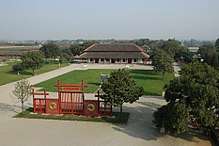Anyang
Anyang (安阳; Ānyáng) is a city about 120 km north of the Yellow River (黄河) in Henan Province.
Understand
Anyang is 460 km south of Beijing and is a prefecture-level city. The northernmost city in Henan, Anyang borders Puyang to the east, Hebi and Xinxiang to the south, and the provinces of Shanxi and Hebei to its west and north, respectively. According to Bronze Age inscriptions, Anyang was the first stable capital city of China dated back to the Shang Dynasty (1554BC–1045BC) during its later period. A great number of oracle bones were discovered in Xiaolitun Village, located at the northwest of Anyang City. The oracle bones were primarily used for divination, and the language used is believed to be the original one used in Chinese characters.
Get in
There are two train stations in Anyang; an older station in the city center and a modern station at the eastern end of the city which serves high-speed rail passing through on the route from Beijing to Zhengzhou.
- 🌍 Anyang Train Station (安阳火车站). Train station in the city center.
- 🌍 Anyang East (安阳东站). High speed railway station on the eastern edge of the city.
From the Zhengzhou airport, direct buses to Anyang run at 1PM and 5PM and cost ¥70. More frequent buses and trains run from within the city of Zhengzhou.
Get around
Taxi and bus are the only public modes of transport within the city.
See
- 🌍 Anyang Museum (安阳博物馆). Tuesday-Sunday. This large museum shows permanent exhibitions on porcelain, traditional Chinese woodblock new year prints, and on archaeological discoveries dating to several centuries that have been excavated during preparation for the "South-North Water Transfer Project". Free.
- 🌍 Huanyuan Garden (洹园), Zhangde Road, Beiguan District, 455000, ☎ +86 372 592 2808. Riverside park.
- 🌍 National Museum of Chinese Writing. Modern museum in a spectacular gold-roofed building. Anyang is the site where the first Chinese writing was found. The museum charts the history of Chinese writing from turtle-shell oracle bones to the modern day. Exhibits are chronological and very well presented. There is plenty of English translation and it is highly informative.
- 🌍 Red-flag Canal, Linzhou District. Nationally famous man-made canal built in the 1960s due to water supply shortage in the area. The construction of the canal was considered an incredible feat at the time and the story of its construction has been told in films.
- 🌍 Tianning Temple (安阳天宁寺塔), 2 Wenfeng North Street, Wenfeng District, 455000, ☎ +86 372 592 3227. Temple with an unusually shaped pagoda.

- 🌍 Yin Ruins (殷墟; Yīnxū) (taxi fare from downtown is about ¥10), ☎ +86-0372-3161002. 8AM-6:30PM (March-October), 8AM-5:30PM (in the winter). Capital of the Shang Dynasty about 1300BC. This site contains a museum, foundations of the Shang Capital and the tomb of Fuhao, a Shang dynasty concubine and general. At this site, many oracle turtle shells where found. Questions were written on the turtle shells and heat applied caused cracks from which the answers to questions were deduced. An important source of early Chinese writing. A pit where chariots were buried. Takes a whole day especially if you know some Chinese characters (or even just few) or are interested in Chinese history. Entrance ticket includes also the free shuttle bus and entrance to the Shang Dynasty Royal Cemetery (Wangling) some 10 minutes by bus away from the main museum. ¥70.
- 🌍 Yinxu Royal Tombs (殷墟王陵遗址) (taxi fare from downtown is about ¥20). Several of the tombs have been turned into museums by a building being erected over the tomb.
- 🌍 Youli Castle Site (羑里城遗址), Tangyin Xian, 107国道 (taxi fare from downtown is about ¥20), ☎ +86 372 623 1399. Cultural remains from Longshan to the Western Zhou periods. The cultural layer is about 7 meters thick. It also comprises remains of the national jail with the longest history in China. It is the very place where "the Western Duke (Jichang) deduced the trigrams into hexagrams during his imprisonment in Youli". Being the leader of the Zhou clan in the end of the Shang Dynasty and with the name of Jichang, King Wen widely adhered to the policy of benevolence, which aroused the suspicious and jealousy of King Zhou of the Shang Dynasty. King Zhou put King Wen into the jail in Youli. During the 7 years of imprisonment, Jichang deducted the nine trigrams of Fuxi into the 64 hexagrams, and wrote the classic "Yi-Ching (the book of changes)". Hence, Youli became the birthplace of the "Yi-Ching", which is known as the origin of the Chinese culture. The later generations built the temple of King Wen in memory of this great man, which has become the sacred place for people to pay respects to the late sage King Wen of the Zhou Dynasty. This place was declared as a National Important Protective Unit of Historical Relics by the State Council in 1996.
- 🌍 Yuan Shikai Tomb (袁世凯墓地). 8:30-17:00. Tomb of first president of the republic of China who attempted to restore the empire with himself as new emperor. ¥35.
- 🌍 Yuefei Temple, 86 Yuemiao Street, Tangyin Xian, 456150, ☎ +86 372 621 3664. Temple to Chinese hero Yuefei in his home village.
Do
Buy
Eat
Drink
- Home Inn, 87 Jiefang Rd, Beiguan District (next to the railway station, on the east side of it), ☎ +86 372-3211111. A standard chain hotel. Doubles ¥150.